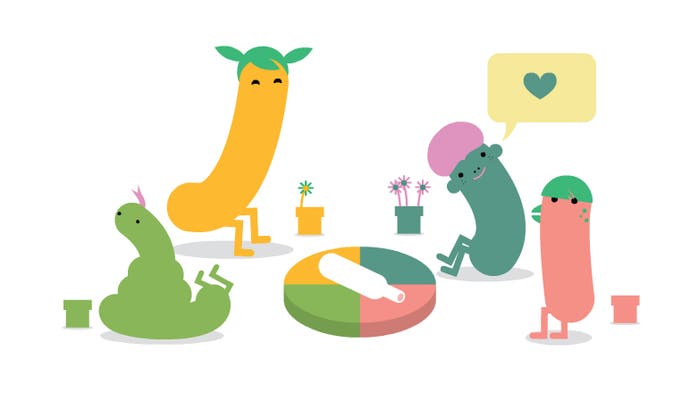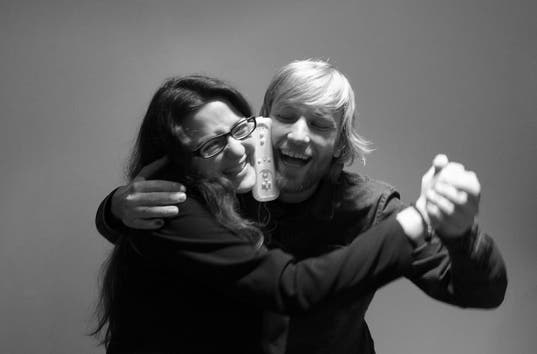Introducing the Wii U's best drinking game
Jeffrey is intoxicated by the upcoming Nordic party game Spin the Bottle... and beer.
Context matters. Out of context I can say that one of my fondest memories of this past GDC involves giving orders to a blindfolded woman crawling on all fours. Despite what you might think, this transpires on the GDC Play showfloor as part of the Danish and Swedish collaborative experimental Wii U party game, Spin the Bottle, "an innocent game for innocent children."
Despite the risque title and light roleplay, KnapNok's Spin the Bottle is a surprisingly wholesome affair. Players spin a virtual wheel on the Wii U GamePad to determine what peculiar motion controlled challenges they'll have to embark on with a partner. No TV is ever used. The mini-game in question above is called Blind Dog, and it requires me to sit down and stand a Wiimote up behind me while ordering my blindfolded partner - chosen by wheel spinning - to crawl forth and retrieve the controller without knocking it over. It's much less creepy than it sounds.
When I first encounter Spin the Bottle I regrettably only have a few minutes to see it before I have to split for a panel. This is the game's last day on the floor and upon trying to work out if I'll have another chance to see it, developer KnapNok's co-founder Dajana Dimovska invites me to get more time with it at a small private shindig called the Official Independent Drinking Games Summit. A game about personal interactions, drinking, and physical contact seems ill-fit for a crowded drab grey showfloor where everyone's hustlin' and bustlin' to get to where they need to go, so I take Dimovka up on her offer and wind up partying with the Copenhagen Game Collective.
In case you've not heard of the Copenhagen Game Collective (or CGC for short), it's the band of indie developers that produced such experimental screenless folk games as Johann Sebastian Joust, B.U.T.T.O.N. and Darkroom Sex Game. All these titles focus on local multiplayer and physical play.

Spin the Bottle is the Copenhagen Game Collective's most accessible game as it can be run on a popular console, and unlike Johann Sebastian Joust it doesn't require several Move controllers. Instead, most of its 17 mini-games require little more than a Wii U Gamepad and a Wiimote or two. It doesn't even require much room, and though the Bohemian garage that's been rented for the occasion is spacious the Spin the Bottle section is relegated to a small plot of land in the middle of the room.
One of the earliest mini-games I encounter is the spectacularly clever Grab the Rooster. In this challenge four Wiimotes are placed on a surface (in this case the floor) and players huddle around to see which one emits a rooster cluck. Our large eight-person game plays this in teams of four vs four. One team is supposed to hit the "A" button as soon as a rooster sound comes out of the Wiimote speaker, while the other team sits facing us and is supposed to hit the "1" button upon hearing the same sound. Both teams need to watch out for chicken calls, which are false alarms and shouldn't be responded to.

The madness ends in drunken giggles after a handful of seconds. This wouldn't happen on the showfloor, but I can almost guarantee this haphazard "anything goes" mentality will happen in several flats once Spin the Bottle comes out this spring.
As we lean down with our ears to the ground people start pushing each other, trying to carve out extra real estate for themselves in the crowded huddle. Within seconds the eight of us are piled on top of each other and I realise there are no rules, so I start moving the Wiimotes closer to me. "Someone grab a camera," I hear KnapNok co-founder Lau Korsgaard yell. No one snaps a picture in time and the madness ends in drunken giggles after a handful of seconds. This wouldn't happen on the showfloor, but I can almost guarantee this haphazard "anything goes" mentality will happen in several flats once Spin the Bottle comes out this spring.
This outside-the-box performative thinking is encouraged throughout. Another game I play is called Saw, wherein partners push and pull their Wiimotes in unison as if cutting through a tree while the controllers' vibration provides feedback on how in step we are. This particular playthrough offers up a bonus challenge: sing a lumberjack song.
My partner and I don't know any lumberjack shanties, so we start mumbling some tune that goes something like, "dum dum dee dum, I don't know any lumberjack songs. Cutting trees among the bees lala lala la la la laaaa..." We get an A for effort, but we're so preoccupied mumbling an impromptu tune that we fall out of sync and fail to saw fast enough.
Some mini-games are a little more conventional and use the GamePad screen. In one I hold the GamePad and must guide a rocket to collect stars and avoid bombs in a 2D wraparound arcade game that resembles a minimalist Asteroids. The catch: the rocket is controlled by my partner holding the Wiimote to their chest. As they bend forward, the rocket pivots down; as they lean back, the ship pulls up. My partner is facing me, so they're flying blind and I must communicate what I need them to do via panicked yelling. "Up up up. No, down a bit. Up more. Dammit, we hit a bomb!"

The challenges only get crazier from there. "Pass the Badger" involves two players with their backs to each other passing a Wiimote from a player's chest over their heads then under their legs without jostling it too much. The goal is to have it arrive back at its starting point under a certain amount of time. The bonus challenge: sing Happy Birthday.
"Denmark or people in Copenhagen are not physical at all. They're actually very reserved. But give them a little bit of alcohol and after two or three beers they become the touchiest people on the planet" Dajana Dimovska, co-founder, KnapNok.
Occasionally the games involve the audience. In "Hide the Monkey" the two chosen participants must hide a Wiimote behind one of their backs while the other players try to guess who has the metaphorical monkey. The bonus challenge in this case allows the audience to tickle the Wiimote-concealing participants.
While Spin the Bottle's various challenges aren't entirely skill-based, it leaves less to chance than one might think. Rather than rigidly taking turns based on a prescribed order, Spin the Bottle's inner-genie selects whoever hasn't played the longest to take a spin with the titular bottle. Furthermore, those who haven't been chosen to play in awhile make up a larger section of the partner-selecting pie chart that the bottle is spun upon. As such, no one winds up twiddling their thumbs on Twitter or Facebook for too long, though getting drunk and wandering off is always a distinct possibility in this sort of environment.
As I marvel at the many intuitive ways KnapNok manipulates the Wii U hardware to make people look at/touch/communicate with each other, I can't help but wonder what it is about Copenhagen in particular that inspires this sort of physical-based gameplay that we don't see in other parts of the world. Dimovska thinks it's because Danes tend to be very reserved by day, but are the exact opposite on the weekends after a few drinks. These sorts of goofy, gropey games offer an opportunity to get more liberated.
"People in Denmark are not physical at all. They're actually very reserved. But give them a little bit of alcohol and after two or three beers they become the touchiest people on the planet," she explains. "Nordic people are not afraid of being physical and naked. And it's socially accepted. Especially when you're in a social setting when you're relaxed and partying."
"We call beer the social lubricant, but I would say the games can also be the social lubricant." Patrick Jarnfelt, developer, Copenhagen Game Collective.
"We call beer the social lubricant, but I would say the games can also be the social lubricant," says Copenhagen Game collective member Patrick Jarnfelt, who didn't work on Spin the Bottle, but has a long history of developing games with the group.

Dimovska clarifies that drunken nudity that tends to come out of parties isn't necessarily a sexual thing in Nordic culture. "Nudity and physical closeness is not considered sexual," she explains. "If you take off your top and you walk around then it's like you're just a bit crazy and nuts. It's not like you're trying to score."
"If nudity or this physical closeness were considered a sexual thing it would just not happen. Because then it's a different setting," she adds. "It's not like 'oh, I'm naked I want to have sex with someone.' That's not the case at all. 'I'm naked. I'm having fun,' is the approach."
This is a culture where crawling like a dog, tickling one another, and stripping off your clothes (which Spin the Bottle doesn't require) is as innocuous as going for a swim, and despite the room being full of good-looking drunk adults, the Drinking Games Summit ends without any tears, shouting matches or venereal diseases spreading, which is more than I can say for most GDC parties I attended this year.
In a vacuum it would be easy to peg Spin the Bottle as a wannabe risque party game in the vein of We Dare, or possibly a pandering team building exercise designed for corporate retreats, but it's none of those things. Rather it's a second childhood: a chance to let go of your inhibitions, forge intimate connections, make up rules, and mess around with your friends without the need for long learning curves, several expensive controllers, or even a lot of space. It really is an innocent game for innocent children.



